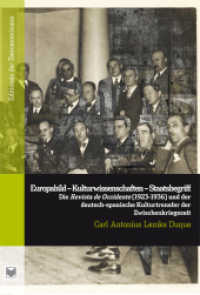Full Description
Based on an extensive corpus-based study, this revealing book explores how epistemic stance is expressed in the early modern period, and in doing so, presents new methodologies for using corpora to investigate issues in historical pragmatics. It provides a new, corpus-driven method for the analysis of pragmatic functions that rely on context-dependent interpretations. By retrieving passages that include a high-density of the pragmatic function under investigation, the subsequent analysis can reveal previously neglected forms and context-dependent factors. It includes four empirical studies that apply the method to the analysis of epistemic stance in four Early Modern English corpora, the result of which emphasise the importance of context for the expression of stance. It also includes an appendix with inventories of Early Modern English stance expressions, offering starting points for further research studies. It is essential reading for researchers and students in historical pragmatics and corpus pragmatics.
Contents
Preface; 1. Introduction; Part 1. Theoretical Background: 2. Historical corpus pragmatics; 3. Stance in Early Modern English; Part II. Methodology: 4. Compiling inventories of lexical stance markers; 5. Retrieving high-density passages; Part III. Empirical Studies: 6. Lexical stance markers in high-density passages; 7. Contextual factors and rhetorical strategies; 8. Meta-communicative expressions and stance: I say and I tell (you); 9. Expressing certainty in different genres; 10. Conclusion; Data; Appendix A: List of high-density passages; Appendix B: Stance inventory.






